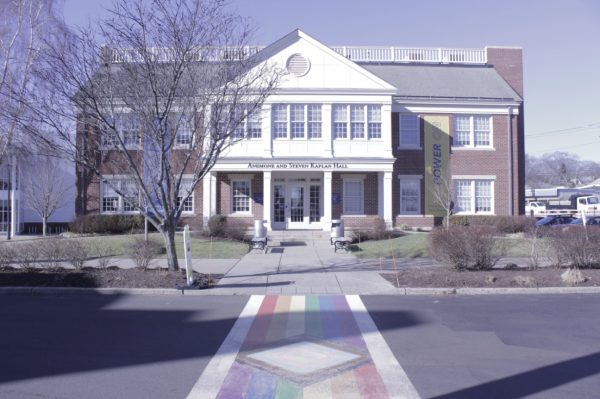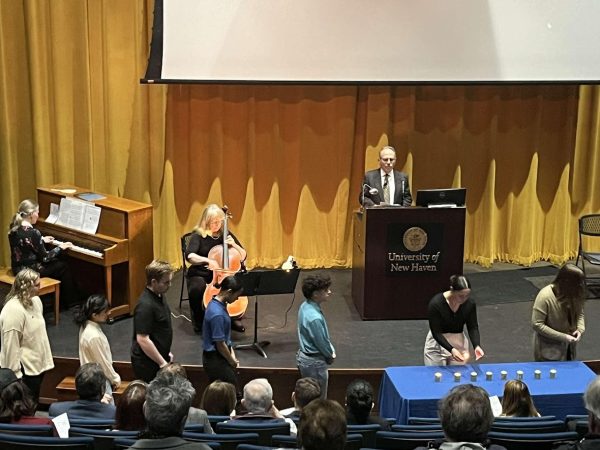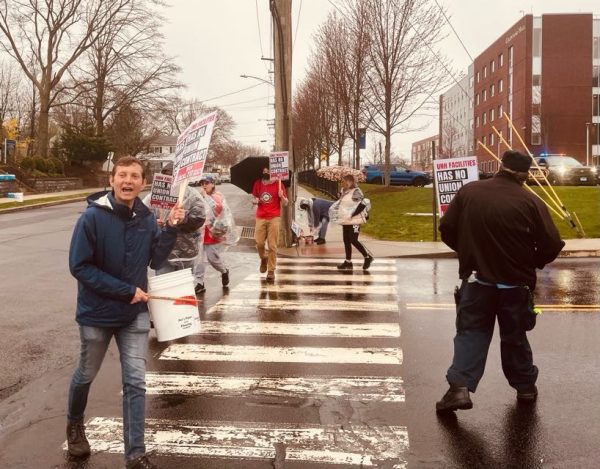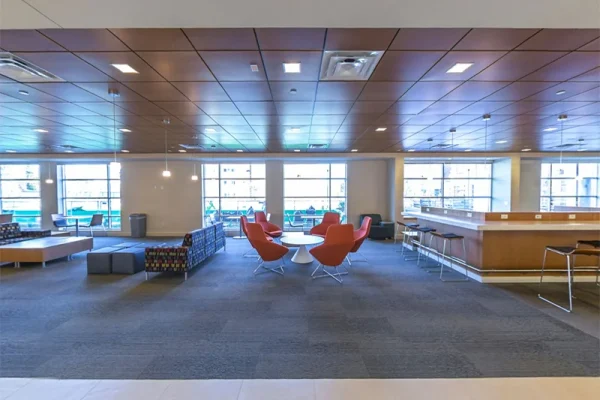MSA continues tradition of honoring and educating on the forgotten
It was four days following the events of Sept. 11, 2001 when the first hate crimes against Muslims were reported. The University of New Haven’s Muslim Student Organization (MSA) invites those in the community to gather each year on this day, Sept. 15, to attend their annual vigil of remembrance.
“9/11 proved to be a tragedy for everyone: those who lost their lives in the attack, and everyone who was blamed for it. So, the Muslim Student Association has committed to remember the victims nobody speaks about,” Laila Soliman said in her opening remarks to the crowd in efforts to spread awareness of the events that began on this day.
The vigil then proceeded to be a space for both members of the Muslim community, and vocal allies, to speak out on the issue at hand.
“Not only did the Arab/Muslim community go through the same trauma as any other community went through,” said Halima Belemlih, professor of Arabic at the university, “but [they] went through more than that. It went through collective fear and collective shame to the point that after the event, whenever an attack happened, everyone is praying please God may it not be a Muslim.”
She then said that her community suffered from “guilt, shame and fear of backlash for something they as individuals did not do.” This is when Belemlih said that a series of attacks on Muslims began.
Belemlih recounted that hijabi women were so targeted that a fatimah, or religious ruling, allowed them to remove their hijabs.
She spoke on the subject of Islamophobia, prefacing with her dislike for the usage of that term. She defined it as “antimuslim bigotry” and “fear, hatred or prejudice towards Islamic Muslims.”
Belemlih dove into the manifestations of discrimination and misunderstanding that stem from this concept, before transitioning to discuss the real-world experiences that have arisen as a result of this issue.
She covered events ranging from her kids facing bullying during school, to legal cases taken to SCOTUS.
“What Muslims find unfair is the way that the media treats various cases of hate crimes depending on the identity of the culprit. If the culprit is Muslim, the crime is always labeled as terrorism. When committed by a non-Muslim, the criminal is either a lone-wolf, has mental issues or [it happened] over a parking dispute, as in the case of the Chapel Hill, North Carolina murders,” Belemlih said.
”It was thanks to the religion that advanced from darkness to the light, not to the spiritual ones only, but the technological ones as well,” she said.
Belemlih also said that seeing the Quran being burned reigned more devastating to the community than other acts of hate crimes or Islamophobia.
“Make friends. Muslims are very hospitable and friendly. They open their doors to new guests easily and happily,” she said, encouraging those in attendance to make strides in the right direction.
To learn Arabic was the next item on her list, followed by taking courses to learn more about their culture. She suggested ones offered by the university.
Following her speech, philosophy professor Douglas Ficek began his time on the stand by thanking MSA for their efforts to organize this event, and for welcoming him as a non-Muslim an opportunity to speak.
He spoke in his remembrance of not only 9/11, but the aftermath that followed, on local, national and international levels.
“Unities are rarely all-inclusive,” Ficek said. “We tend to define our unified, collective selves in terms of opposition; in terms of some obstacle, some threat, some evil, and after 9/11 for many Americans, unity meant opposing Muslims, full-stop and without distinction.”
He continued to describe how across the country, this group of individuals was seen as a threat, in what he described as a “bigoted” view from many Americans.
“Islamophobia isn’t just discursive; it isn’t just words. As we all know, hate crimes against Muslims and people mistakenly perceived to be Muslims increased dramatically after 9/11,” Ficek said.
He told the crowd that in 2000, the FBI reported less than 30 anti-Muslim hate crimes, but in 2001, there were 480, and three in just the first week alone.
Ficek delved into workplace discrimination, deportation and other items in the realm of unjust Muslim experience as observed from the outside, even such sponsored by the state.
He called this “a problem that sadly endures decades after the 9/11 attacks; a problem for which non-Muslims must take greater responsibility.”
Soliman read a speech on behalf of a student who was unable to be in attendance, Aiya Chahid.
“They say ‘never forget,’ but I grew up forgetting my identity,” they began.
“They say ‘never forget,’ but my parents forgot to teach me their mother tongue, after being told I would fall behind in school and sticking to English was better. Halfway to 20 and I still don’t know the Arabic alphabet. They say ‘never forget,’ but manners seemed to split the mind of my peers as the history classes kept circling back to a conversation about terrorists to which I have no relation, yet the deafening stares from my classmates made me dread the same day every year. They say ‘never forget,’ but I’m sure the bullies from my elementary school forgot about how my brother grew up laughing with them as they called him Bin Laden’s son.”
“They say ‘never forget;’ how can I? My mom still refuses to wear a hijab after a woman discriminated against us in a parking lot almost 18 years ago,” they continued.
Soliman then took a moment of silence in process of the pain harbored by everyone. They then closed the ceremony, saying that they hope everyone takes inspiration from the day’s events and aims for the creation of safe spaces for all going forward.
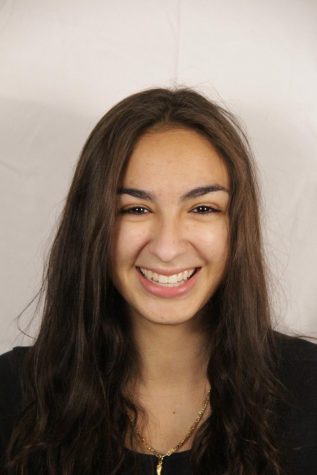
Mia Adduci is a senior studying communication concentrating in multi-platform journalism and media who began writing for the paper her first semester on...

